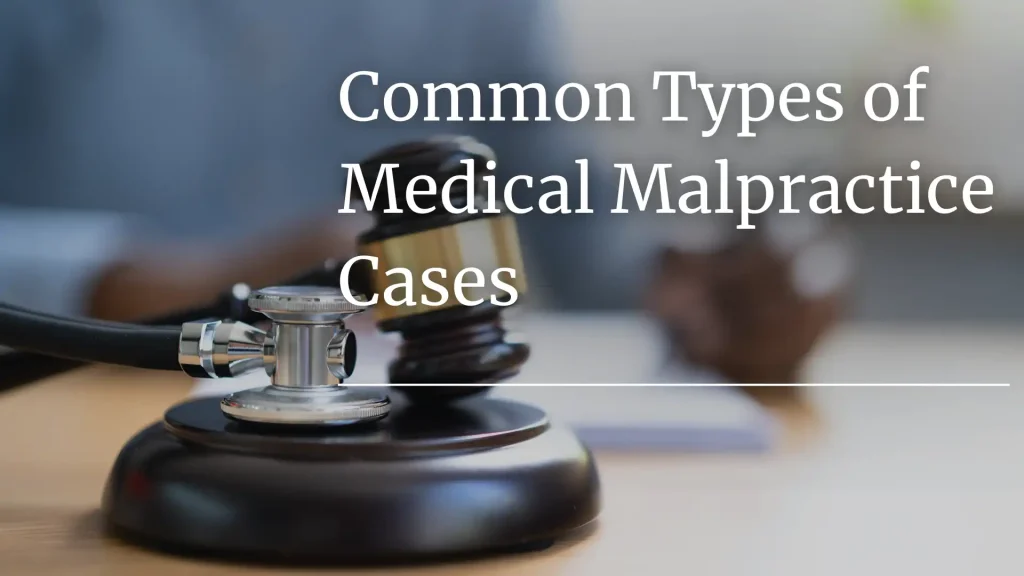Posted on Monday, July 1st, 2024 at 9:00 am

Medical malpractice occurs when healthcare professionals harm patients by failing to provide them with the accepted standard of care. When you visit a healthcare provider, you have the reasonable expectation that they won’t injure you or worsen your condition. But when this happens, you can recover compensation for your injuries through a medical malpractice claim. A seasoned Illinois medical malpractice lawyer can advise you about whether you have a case.
Six Common Types of Medical Malpractice
Sometimes, it can be unclear whether you suffered from medical malpractice. Do you have a valid claim or not? To understand your rights, you need to know some of the common forms medical malpractice takes:
- Misdiagnosis – A misdiagnosis occurs when a medical provider incorrectly identifies a patient’s condition, which could lead to incorrect or delayed treatment. If a doctor misdiagnoses a stroke, it can leave the patient with permanent injuries or even cause their death. If they diagnose someone with cancer who doesn’t have cancer, that can cause emotional suffering and other harm from inappropriate treatment.
- Failure to Diagnose – Failure to diagnose occurs when the medical provider completely misses a correct diagnosis of the patient’s condition. A misdiagnosis can lead to delayed treatment or the patient going without treatment altogether.
- Surgical Errors – Surgical errors are mistakes made by a doctor during surgery. They may include operating on the wrong body part, performing the wrong procedure, or even leaving surgical instruments within the patient’s body. These errors can injure patients more than they already were.
- Birth Injuries – Birth injuries can occur during pregnancy, labor, or delivery and harm both the mother and child. Some birth injuries are due to a misdiagnosis or failure to diagnose during pregnancy. However, others may be due to actions taken during the delivery, such as pulling on the child or failing to provide a C-section when necessary.
- Medication Errors – Medication errors occur when doctors or pharmacists prescribe, dispense, or administer medication incorrectly. These errors could involve providing patients with incorrect medications, incorrect dosages, or medications with harmful interactions.
- Failure to Treat – Failure to provide treatment occurs when a healthcare provider correctly diagnoses a patient’s ailment but does not provide adequate treatment. For example, they may not refer the patient to a specialist who could fix their problem, or they may discharge a patient earlier than they should.
Navigating Medical Malpractice Claims
If you believe you are the victim of medical malpractice, what steps should you take to protect your right to compensation for your injuries? Once you know a medical provider injured you, you should do the following:
- Consult an Attorney – Seeking legal advice from an experienced medical malpractice attorney is crucial for your case. An attorney can explain your legal options, collect evidence supporting your case, and represent your best interests in settlement negotiations and at trial.
- Gather Medical Records – You can use your medical records to establish the facts of your case. Your records will include your diagnosis, treatments, and other notes that can provide context for your injuries. For example, they may show that your doctor diagnosed you with a particular condition but then provided a treatment that doesn’t work on that condition.
- Seek Expert Testimony – Your attorney can assist you in finding expert witnesses to provide testimony supporting your claim. For example, if your oncologist failed to diagnose your cancer, your attorney may hire another oncologist to explain how this failure to diagnose was negligent.
- File Your Claim – Once you have sufficient evidence to support your case, it’s time to file your medical malpractice claim. In Illinois, the statute of limitations allows victims of medical malpractice two years from the date they were harmed to file a lawsuit against the negligent provider. Your attorney can assist you in filing your claim within this period so you don’t miss out on your right to compensation.
Proving Negligence in Healthcare
To prove medical negligence, you must demonstrate four things:
- Duty of Care – You must show that the healthcare provider owed you a duty of care. That duty required them to provide treatment that meets medical community standards. For example, if you visit a doctor for a particular injury, that doctor should look at it and prescribe a reasonable treatment for it.
- Breach of Duty – You must show that the healthcare provider breached their duty of care in some way. Let’s say you visited a doctor for constant migraines. The doctor gave you a prescription for painkillers without attempting to determine the cause of your migraines. In this case, they may have breached their duty to reasonably assess and treat your condition.
- Causation – You must show that the healthcare provider’s breach of duty directly caused your injury. For example, if you had a treatable illness, you could show that your doctor failed to diagnose it. You’d have to show that you suffered long-term or permanent injury because of that failed diagnosis.
- Losses – Finally, you must show that you suffered losses due to the medical provider’s negligence. If a doctor misdiagnoses your cold as the flu, no harm that causes you to suffer physically, mentally, or financially may result. However, a doctor misdiagnosing your malignant tumor as benign likely would.
Compensation in Medical Malpractice Lawsuits

In Illinois, victims of medical malpractice can seek compensation for their economic and non-economic losses. Economic losses are those with monetary value, while non-economic losses are subjective losses without specific values attached.
Economic losses include your past and future medical bills, rehabilitation costs, and lost income associated with your injury. Because economic losses include future costs, it’s essential to have your case evaluated by an experienced attorney, Your attorney can assess the lifetime value of your case.
Non-economic losses include the physical pain and suffering, the emotional distress, and the loss of enjoyment of life you experienced because of your injuries. These losses can be challenging to quantify, but an experienced attorney and expert testimony can establish their value.
Contact a Chicago, Illinois, Medical Malpractice Attorney
Were you injured by a medical provider’s malpractice in Illinois? Call (312) 261-6193 or contact us online for a free consultation about your case with an experienced medical malpractice attorney from Wallace Miller.
Our team has decades of experience fighting for our clients’ rights to compensation for their injuries. During your initial consultation, we’ll evaluate your case, explain your options, and answer any questions you have about the claims process.
